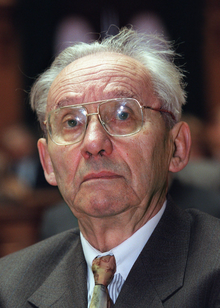Paul Ricœur
Appearance

Paul Ricœur (1913 – 2005) was a French philosopher famous for combining phenomenological description with hermeneutics.
| This article about a philosopher is a stub. You can help out with Wikiquote by expanding it! |
Quotes
[edit]- I dislike those who present myself as a Protestant philosopher; I am a philosopher and a Protestant.
- Je suis irrité lorsqu’on me présente comme philosophe protestant, je suis philosophe et protestant.
- Paul Ricœur : "Je ne suis pas un philosophe protestant" (January 13, 2016)
- Je suis irrité lorsqu’on me présente comme philosophe protestant, je suis philosophe et protestant.
- If we go back to the intention [Marx, Nietzsche and Freud] had in common, we find in it the decision to look upon the whole of consciousness primarily as "false" consciousness.
- Freud and Philosophy (1970), p. 33
Lectures on Ideology and Utopia (1975)
[edit]- Lectures delivered at University of Chicago in 1975, published by Columbia University Press in 1986
- The possibility of noncongruence, of discrepancy, in many ways already presupposes that individuals as well as collective entities are related to their own lives and to social reality not only in the mode of participation without distance but precisely in the mode of noncongruence. ... The presupposition here is precisely that of a social imagination, operating in both constructive and destructive ways, as both confirmation and contestation of the present situation.
- p. 3
- People do things, and then they imagine what they are doing in a kind of cloudy realm. Thus we say first there is a social reality in which people fight to earn their living, and so on, and this is real reality, as praxis. This reality is then represented in the heaven of ideas, but it is falsely represented as having a meaning autonomous to this realm, as making sense on the basis of things which can be thought and not done or lived. The claim against ideology therefore comes from a kind of realism of life, a realism of practical life for which praxis is the alternative concept to ideology. Marx's system is materialist precisely in its insistence that the materiality of praxis precedes the ideality of ideas.
- p. 5
Quotes about Paul Ricoeur
[edit]F
[edit]- The "hermeneutics of suspicion" is a phrase coined by Paul Ricoeur to capture a common spirit that pervades the writings of Marx, Freud, and Nietzsche. In spite of their obvious differences, he argued, these thinkers jointly constitute a "school of suspicion." That is to say, they share a commitment to unmasking "the lies and illusions of consciousness;" they are the architects of a distinctively modern style of interpretation that circumvents obvious or self-evident meanings in order to draw out less visible and less flattering truths (Ricoeur 356). Ricoeur’s term has sustained an energetic after-life within religious studies, as well as in philosophy, intellectual history, and related fields[.]
- Rita Felski, "Critique and the Hermeneutics of Suspicion", M/C Journal, Vol. 15, No. 1 (2012).
I
[edit]- In 1965, French philosopher Paul Ricœur called Marx, Nietzsche, and Freud the three “maîtres du soupçon,” the “masters of suspicion” that made us regard the conscience as something suspect. Because of these three ideologues, many no longer trust their conscience. They are no longer sure that it is the innate voice of God or human nature. What if the “masters of suspicion” were right, and what we call the voice of conscience is in fact the voice of those who want to deny us the right to revolution, to power, and to pleasure, who have instilled in us their pseudo-values and taught us to call them conscience?
- Massimo Introvigne, "Tai Ji Men: Defending Conscience Against Its Enemies", Bitter Winter (2023)
J
[edit]- Ricoeur distinguishes between two forms of hermeneutics: a hermeneutics of faith which aims to restore meaning to a text and a hermeneutics of suspicion which attempts to decode meanings that are disguised.
- Ruthellen Josselson, "The hermeneutics of faith and the hermeneutics of suspicion".
O
[edit]- Paul Ricœur speaks of the theologian as a hermeneut, whose task is to interpret the multivalent, rich metaphors arising from the symbolic bases of tradition so that the symbols may 'speak' once again to our existential situation.
- Anne Hunt Overzee, "The body divine: the symbol of the body in the works of Teilhard de Chardin and Rāmānuja," Cambridge Studies in Religious Traditions, Cambridge University Press, p. 4.
R
[edit]- French philosopher Paul Ricœur (1913–2005), in his book “De l’interprétation. Essai sur Sigmund Freud,” published in 1965, coined the expression “school of suspicion” to describe the collective cultural aim of such famous authors as Karl Marx (1818–1883), Sigmund Freud (1856–1939), and Friedrich Nietzsche (1844–1900). While proclaiming very different and even opposite philosophies, in Ricœur’s view the ultimate attempt of Marx, Freud, and Nietzsche was to teach that reality itself cannot be trusted and fundamentally lies, and that all existing authorities are false. As “masters” (or teachers) “of suspicion,” their credo was not the legitimate critique of existing authorities for their mistakes and misdeeds, but the basic delegitimization of the very concept of authority in itself.
- Marco Respinti, "Teachers Are Necessary, Spiritual Teachers Are Essential", Bitter Winter (October 2022)

